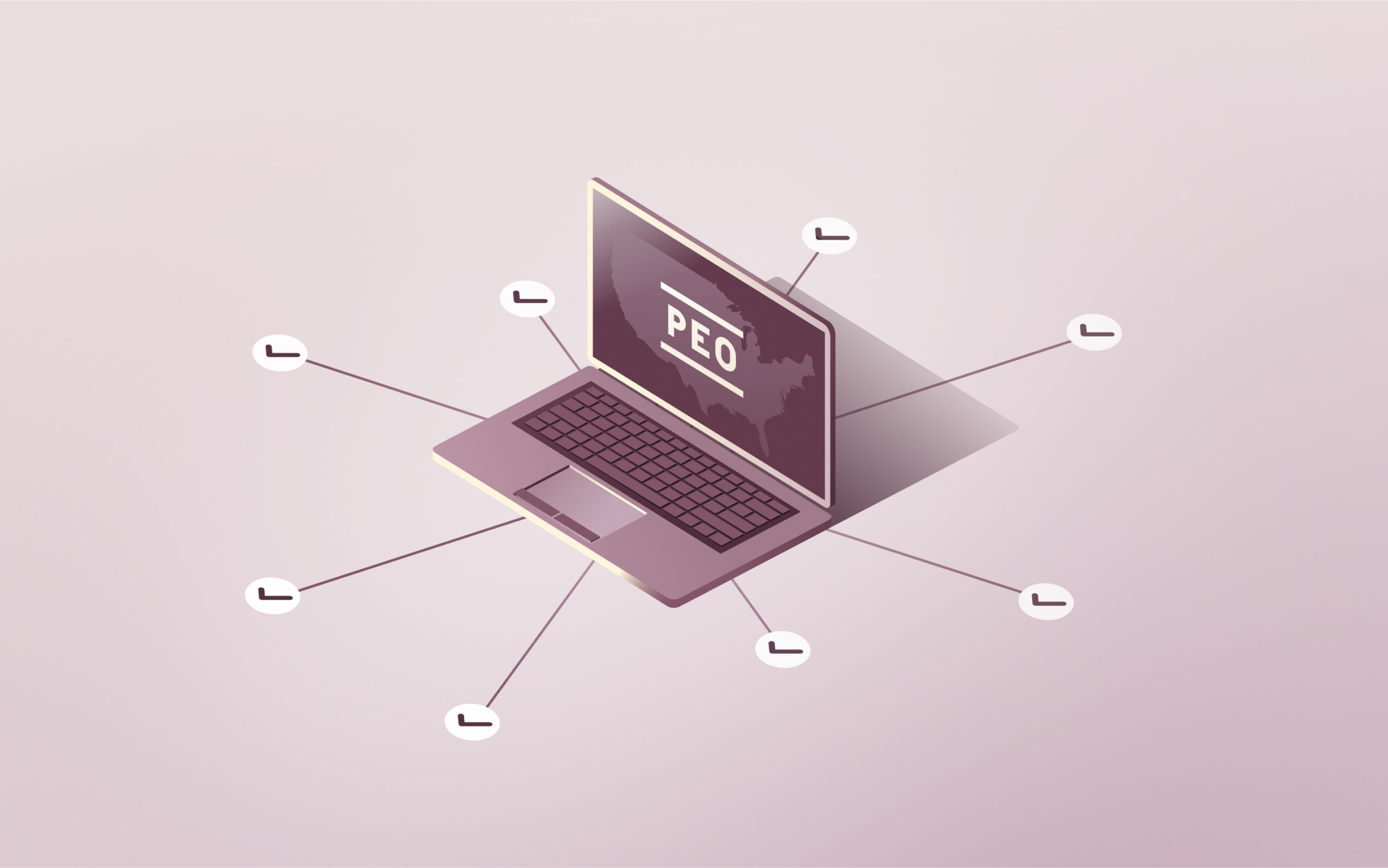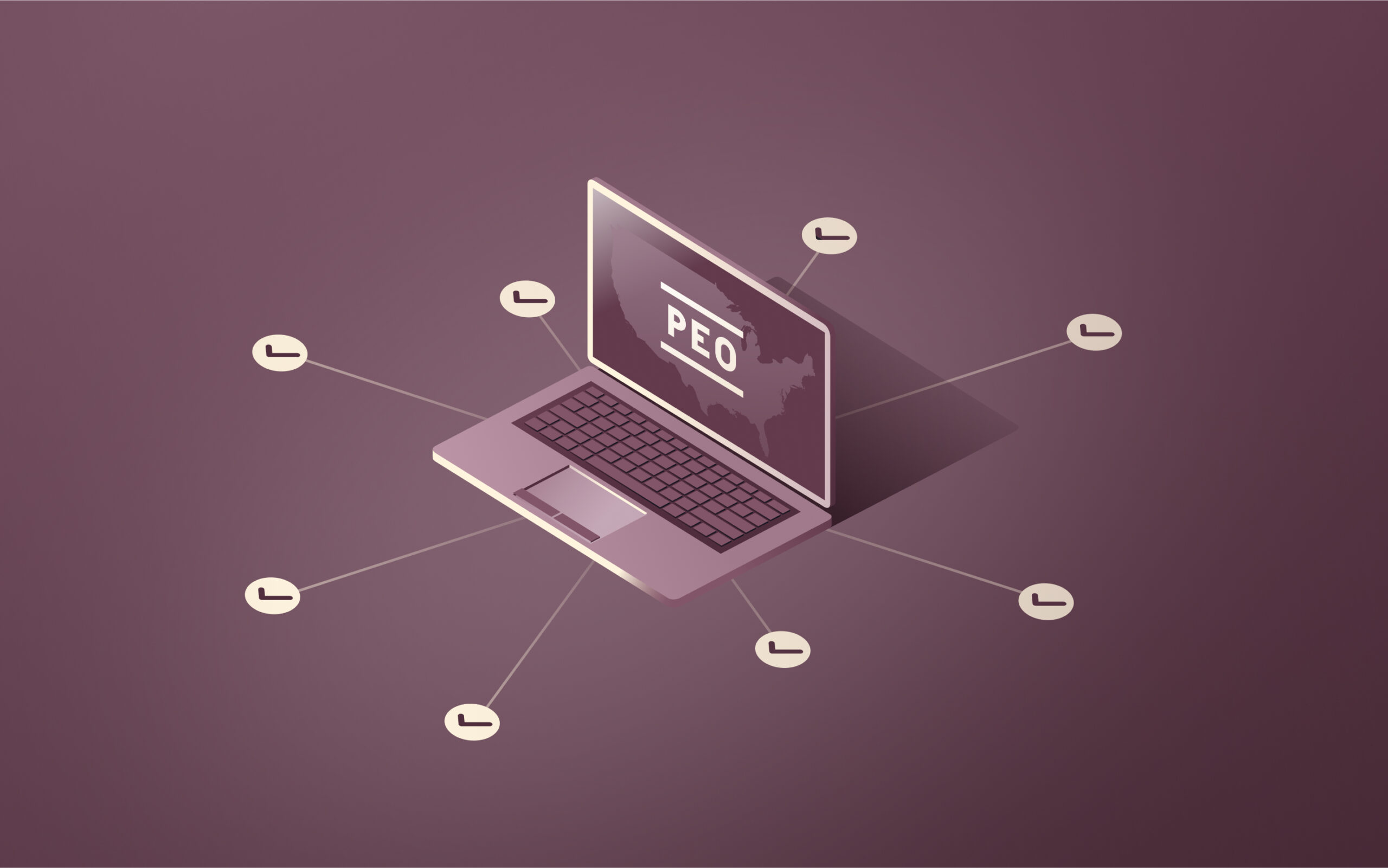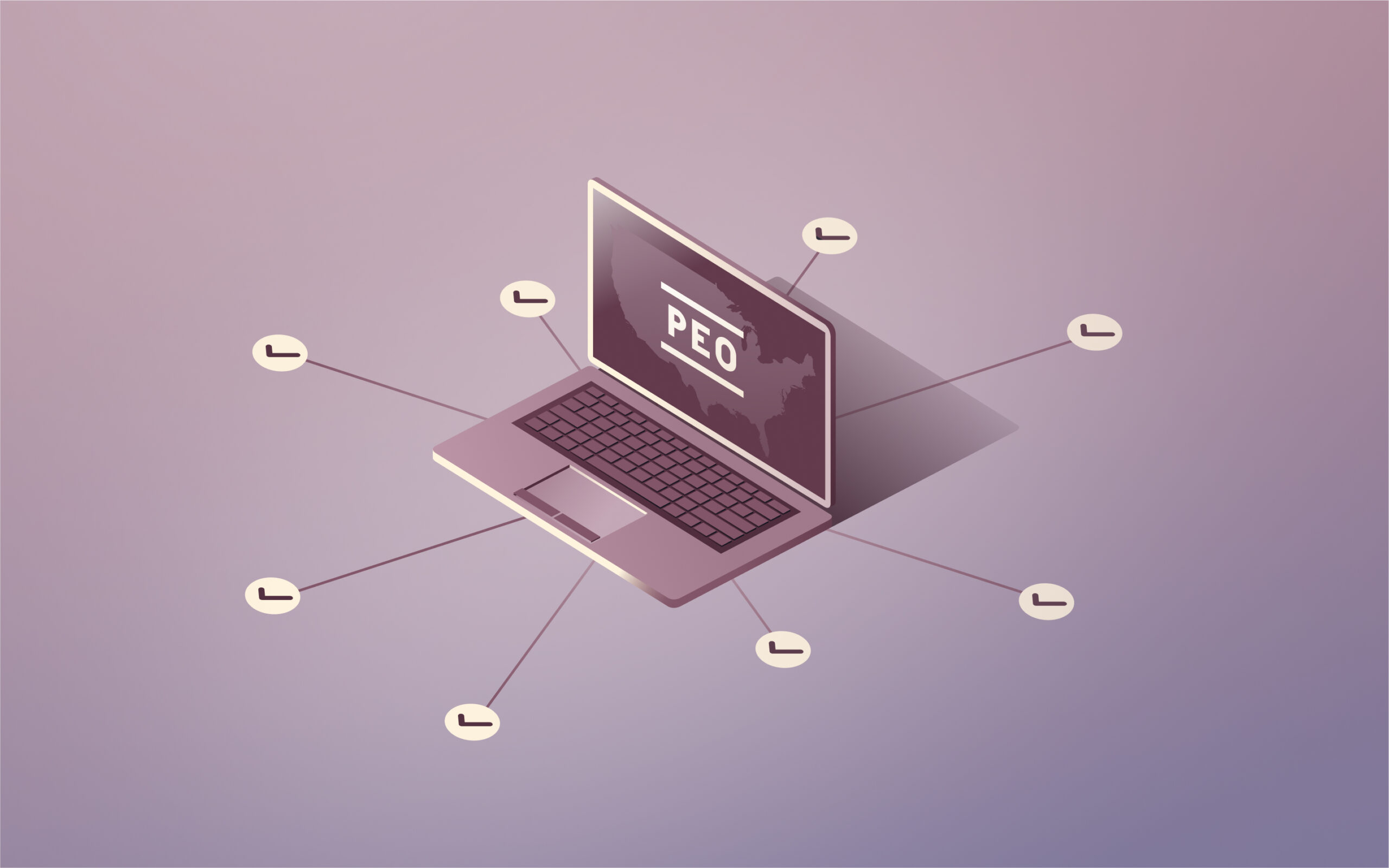PEO in Florida [2025]

A professional employer organization (PEO) is a cost-effective solution for Florida businesses looking to reduce their administrative human resources workload. PEOs help businesses of all sizes, especially small and medium-sized operations, outsource, automate, and streamline various HR functions, including payroll solutions, compliance, benefits administration, and workers’ compensation insurance. At the same time, partnering with a PEO helps businesses access better and more affordable benefits for their workforce.
The Sunshine State ranks as one of the top states in the US for its business climate. The corporate tax rate is 5.5%, state sales tax is currently 6%, and Florida’s cost of living is about the same as the national average. Even with these positives, running a business can be expensive, so the possibility of reduced HR costs and affordable benefits motivate plenty of Florida businesses to partner with PEOs.
This article will explain how a PEO works, how your business can benefit from it, and how to choose the right one. From automatic state tax registration to ACA and COBRA administration, Rippling PEO simplifies HR tasks in Florida and across the US.
Benefits of using a PEO in Florida
Joining a Florida PEO service can help businesses reduce administrative HR work, access superior benefits at a lower cost, gain valuable HR support and knowledge, and more.
Offload administrative HR work
When you partner with a PEO, you enter into a co-employment relationship, which means you and the PEO share the responsibilities that come with employing your workforce. This arrangement designates you as the worksite employer, giving you full control over hiring and termination decisions, compensation, business strategy, and operations such as research and development, sales, marketing, and customer support.
The PEO functions as the administrative employer and assumes responsibility for employing your workers under its federal tax identification number (EIN). This enables the PEO to handle employment-related HR tasks such as payroll, benefits management, compliance, risk mitigation, and more.
PEO companies utilize a mix of technology, established procedures, and expertise to simplify HR management. As a result, your team is relieved from time-consuming manual administrative services and can instead concentrate on crucial strategic initiatives that contribute to your company's success.
Better employee benefits, at a lower price
The strength of a PEO is in its numbers. According to the latest figures from the National Association of Professional Employer Organizations (NAPEO), more than 500 PEOs are operating in the country. Between them, they employ 4.5 million workers at 200,000 US businesses. By leveraging the number of people they “employ” from different companies, the PEO can negotiate with insurance providers and give you and your employees access to better and more affordable benefits.
PEOs offer access to a wide range of benefits plans, often including health insurance, retirement plans, worksite benefits, life and disability insurance, mental health support, benefits for commuters, and dependent care. Benefits like these are key to attracting and retaining the best talent. By working with a PEO, small business owners can offer benefits packages they might not be able to provide on their own. Keep in mind that PEOs don’t sell benefits directly. Instead, they provide access via third-party providers.
Under the federal Affordable Care Act (ACA), employers in Miami, Orlando, and across Florida with 50 or more full-time employees must provide health insurance coverage. Businesses in the state can use a PEO to help deliver the required healthcare benefits and offer other popular benefits to their workforce, often at a lower cost than they could on their own.
Worry-free compliance with Florida laws
PEOs can assist your company in many ways, including complying with federal labor and employment laws and complex, ever-changing state-level and local Florida laws. Florida’s minimum wage is an excellent example of something businesses must keep on top of. The state recently made changes to its minimum wage laws: As of September 30, 2023, the Florida minimum wage is $12 per hour. It’s scheduled to increase by $1 yearly from September 30th until 2026, when it reaches $15. There is a lower minimum wage for tipped workers in the state.
Keeping up with changing minimum wage regulations, especially with a workforce spread out across the country, can be challenging. A PEO like Rippling eases the burden by automatically flagging wage violations based on where your employees live, ensuring you’re always compliant with state and federal minimum wage laws.
In addition to minimum wage legislation, PEOs can provide legal and compliance support with:
- Payroll laws, including employer and employee classifications; generating and filing tax forms; managing all aspects of payroll taxes, including tax withholding and filing with the right agency at the right time; and adhering to other wage regulations, like overtime requirements
- Benefits regulations, including helping you comply with sick leave laws in Florida, in addition to other laws like the ACA, COBRA, FSA, HSA, and similar regulations
- Labor laws, including providing workers’ comp, assistance in following Equal Employment Opportunity (EEO) laws and the Florida Civil Rights Act, and distributing labor posters as required by the state
The consequences of violating these federal and state laws include costly fines and penalties for business owners. Surprisingly, the IRS reports that up to 40% of small businesses find themselves on the hook for payroll penalties every year, so compliance support is a significant cost-saving benefit of using a PEO.
Dedicated support team
When you join a PEO, you gain access to their HR expertise. This access is invaluable for small businesses and startups that don't have similar in-house resources. A PEO can increase efficiency, lower costs, and offer professional advice to help your HR team with overhauling your benefits administration, training managers, reviewing health and safety compliance, creating employee documentation, and other HR challenges.
What to consider when evaluating a PEO service in Florida
Whether you’re based in Tampa, Tallahassee, or anywhere in between, when looking for a suitable PEO for your Florida business, there are several factors to take into account:
- Your business requirements. How can a PEO help meet them? Offerings often include:
- Payroll services
- Benefits access and administration
- Recruiting and onboarding
- Regulatory compliance oversight
- Time and attendance tracking
- Tax filing and compliance
- Risk mitigation
- General HR employee management
- HR outsourcing
- Your budget. PEOs employ a variety of pricing structures—typically either monthly fees per employee or a percentage of the total payroll. It’s crucial to factor in potential growth or expansion when deciding on a PEO to make sure you can sustain the cost as your employee headcount increases.
- Reputation and experience. Does the PEO have a solid history working with Florida businesses? Are they highly regarded? You may want to refer to review sites like Capterra and G2 to gather feedback from past and current PEO clients.
- Benefits. Examine the scope, quality, and cost of the PEO’s benefits packages. Do they align with the preferences and requirements of your employees?
- Benefits renewal rates. Does the PEO openly disclose the increase in cost for its benefits plans after the initial year? Some PEOs significantly raise their renewal rates, leaving businesses with unexpected expenses or the burden of searching for a new solution after only one year. It’s important to select a PEO that’s transparent about its rate changes, allowing you to anticipate any potential increases.
- Integrations. How will the PEO be integrated into your current systems, tools, and technology?
- Does the PEO have expertise in certain industries? If your company operates in a specialized industry, it may be beneficial to choose a PEO with experience in that particular field.
- Does the PEO have expertise in specific legal or compliance matters? If your company needs to comply with certain federal or state regulations or other legal matters, it might be helpful to seek out a PEO with specialized knowledge and experience.
- Your exit strategy. At some point, you may decide to end your partnership with the PEO, whether to bring your HR processes in-house or switch to a different solution. Some PEOs may make it challenging to terminate your contract, requiring you to completely overhaul your systems. It’s wise to consider this possibility before entering into a partnership with a PEO.
Why Rippling PEO is the right choice for your Florida business
Rippling PEO is the first to integrate HR, IT, and Finance into a single platform, making your daily tasks more efficient and seamless. From 90-second onboarding to remote IT management and benefits admin, Rippling streamlines all your HR busy work. Unlike other PEOs that still rely on outdated software from the 1980s, Rippling runs on a modern and user-friendly platform.
Our services include managing crucial compliance responsibilities, such as creating state and local tax accounts and identifying minimum wage and overtime infractions, while also offering your team access to top-quality benefits at reasonable rates.
With Rippling, you get:
- HR, IT, and Finance systems in a single platform
- Robust metrics and customizable employee data reporting
- Solutions for overseeing remote teams, such as digitized onboarding processes, automated state tax registration, and remote laptop management
- Access to premium benefits plans and the comfort of below-average, predictable renewal rates for our services
- Automated detections and recommended solutions for compliance issues at the federal, state, and local levels
- Risk management process automation, including ACA and COBRA administration and anti-harassment training for your employees
- Access to all of Rippling’s HR resources, templates, and guides
If you ever choose to bring your HR services in-house, transitioning on and off Rippling PEO is a simple process. Unlike other PEOs with a complicated switching procedure, Rippling allows for a smooth transition to our comprehensive workforce management platform. Your HR, payroll, and employee information will remain stored in your account, your integrations with other systems will remain intact, and your employees can continue to use the platform with their current logins.
FAQs about PEOs in Florida
What is a PEO, and how does it work?
Professional employer organizations (PEOs) provide streamlined and comprehensive HR solutions for businesses, such as payroll processing, benefits management, and compliance support. For tax purposes, the relationship is usually arranged as a co-employment model, and the PEO becomes the legal employer of the company’s workforce.
How does a PEO arrangement affect control over my employees?
Your company will continue to control general operations and employee management. The PEO will allow you to outsource HR administrative tasks and liability oversight.
What is a Certified PEO?
A Certified PEO (CPEO) has earned the qualification through an IRS assessment of aspects of the PEO's history, location, expertise, and management practices. The certification program is voluntary and doesn’t signify IRS endorsement. In prior years, CPEO status was advantageous for tax purposes; however, the laws have changed, and those benefits are no longer relevant.
What size company can benefit from a PEO?
PEOs work with a variety of companies, but typically, small to mid-sized businesses gain the most advantages. Beyond outsourcing their day-to-day HR tasks and mitigating risks, partnering with a PEO enables them to access premium, comprehensive benefits plans that would ordinarily only be available to larger companies.
How does a PEO charge for its services?
PEO costs vary according to the range of services provided and the size of the workforce. They are often based on either a percentage of the total payroll or a flat monthly fee based on the number of employees.
What is the implementation process, and how long does it take to go live?
After an initial phase of information gathering and evaluation of your company’s HR needs, the PEO will typically set up their systems and integrate their task management platforms. Administrative duties such as payroll, benefits administration, and risk management will be shifted or automated. The PEO may hold sessions to orient your team to the new employee benefits, updated procedures, and technology.
The transition time can range from a few weeks to a couple of months, depending on the size of your company and the services you select.
Are PEOs regulated?
Yes, PEOs must adhere to federal and state regulations, and many opt to obtain accreditation through industry organizations for increased credibility.
Are PEOs in Florida required to have special certifications or licenses?
In the state of Florida, PEOs require a license from the Florida Department of Business and Professional Regulation Employee Leasing Companies division. In addition, they must carry a Certificate of Authority from the Florida Department of State to operate in the state. PEOs are also subject to any relevant state labor and insurance regulations.
What happens if I want to terminate my relationship with a PEO?
Ending a relationship with most PEOs can result in significant challenges and interruptions for your company. When you take necessary systems away, it can be difficult for your business to find alternative solutions for the tasks previously handled by the PEO.
With Rippling PEO, bringing your HR back in-house is as simple as switching the PEO off and transitioning seamlessly to our all-in-one workforce management platform, leaving all your systems, data, and integrations intact.
In what states is Rippling PEO available?
Rippling PEO is available nationwide.
Disclaimer: Rippling and its affiliates do not provide tax, accounting, or legal advice. This material has been prepared for informational purposes only, and is not intended to provide or be relied on for tax, accounting, or legal advice. You should consult your own tax, accounting, and legal advisors before engaging in any related activities or transactions.





